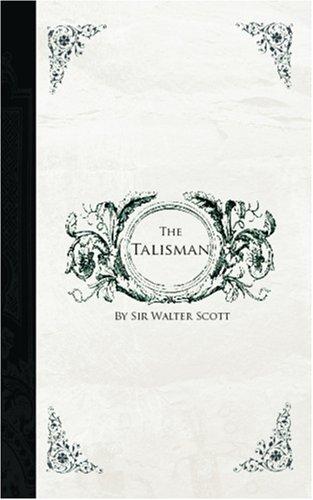Poŝlibro, 354 paĝoj
Lingvo: English
Eldonita je 12-a de julio 2006 de BiblioBazaar.

Poŝlibro, 354 paĝoj
Lingvo: English
Eldonita je 12-a de julio 2006 de BiblioBazaar.
Through a series of adventures, a poor but doughty Scottish crusader known as Sir Kenneth proves his honor and discovers his destiny in Sir Walter Scott's tale of chivalry, violence, virtue, romance, and deceit.
Sir Walter Scott writes wonderfully enjoyable historical fiction. He first ventured into this realm in 1814 with the novel, Waverley which was published anonymously as Scott's first venture into prose fiction and possibly the first-ever historical novel. His subsequent novels came to be called Waverley novels, including this story. The Talisman is the middle in the trilogy about one of England's most popular kings ~~ King Richard I (the Lion-Hearted), which begins with The Betrothed and concludes with Ivanhoe.
There are many times Scott (through his characters) gets a bit carried away in song and verse, but if you can overlook (or skim through!) these, it's a fine adventure story about the Third Crusade. Some might …
Through a series of adventures, a poor but doughty Scottish crusader known as Sir Kenneth proves his honor and discovers his destiny in Sir Walter Scott's tale of chivalry, violence, virtue, romance, and deceit.
Sir Walter Scott writes wonderfully enjoyable historical fiction. He first ventured into this realm in 1814 with the novel, Waverley which was published anonymously as Scott's first venture into prose fiction and possibly the first-ever historical novel. His subsequent novels came to be called Waverley novels, including this story. The Talisman is the middle in the trilogy about one of England's most popular kings ~~ King Richard I (the Lion-Hearted), which begins with The Betrothed and concludes with Ivanhoe.
There are many times Scott (through his characters) gets a bit carried away in song and verse, but if you can overlook (or skim through!) these, it's a fine adventure story about the Third Crusade. Some might say the history is a bit fanciful, some might even say it's more fantasy than history. Well, never mind, standards were different then. Indeed, Scott rather set the standard as it were. It is true he was a staunch Protestant and thought most of the problems with the period had to do with Roman Catholicism, and could be cured by the Reformation, but we're all entitled to our opinions, especially when it's your book.
All that said, if you haven't read it, it's worth the reading from the perspective of Scott's perspective, even if it weren't a rollicking good tale, which it is!--booklady (goodreads)